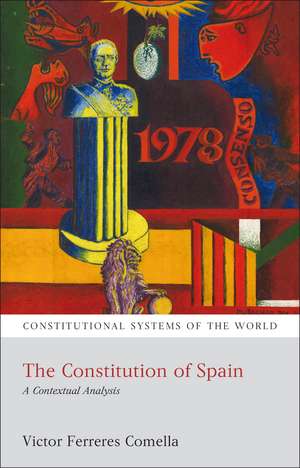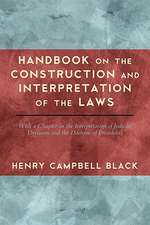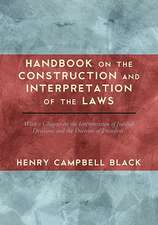The Constitution of Spain: A Contextual Analysis: Constitutional Systems of the World
Autor Victor Ferreres Comellaen Limba Engleză Paperback – 12 mai 2013
Din seria Constitutional Systems of the World
- 13%
 Preț: 174.07 lei
Preț: 174.07 lei - 38%
 Preț: 134.64 lei
Preț: 134.64 lei - 23%
 Preț: 197.68 lei
Preț: 197.68 lei - 14%
 Preț: 147.59 lei
Preț: 147.59 lei - 34%
 Preț: 509.52 lei
Preț: 509.52 lei - 28%
 Preț: 374.41 lei
Preț: 374.41 lei - 40%
 Preț: 466.81 lei
Preț: 466.81 lei - 22%
 Preț: 263.72 lei
Preț: 263.72 lei - 23%
 Preț: 185.93 lei
Preț: 185.93 lei - 19%
 Preț: 166.82 lei
Preț: 166.82 lei - 23%
 Preț: 152.82 lei
Preț: 152.82 lei - 21%
 Preț: 218.26 lei
Preț: 218.26 lei - 23%
 Preț: 178.47 lei
Preț: 178.47 lei - 19%
 Preț: 303.62 lei
Preț: 303.62 lei - 18%
 Preț: 300.14 lei
Preț: 300.14 lei - 30%
 Preț: 510.03 lei
Preț: 510.03 lei - 14%
 Preț: 192.30 lei
Preț: 192.30 lei - 18%
 Preț: 304.66 lei
Preț: 304.66 lei - 23%
 Preț: 178.02 lei
Preț: 178.02 lei - 18%
 Preț: 225.31 lei
Preț: 225.31 lei - 23%
 Preț: 197.14 lei
Preț: 197.14 lei - 18%
 Preț: 180.44 lei
Preț: 180.44 lei - 18%
 Preț: 186.35 lei
Preț: 186.35 lei - 14%
 Preț: 179.00 lei
Preț: 179.00 lei - 16%
 Preț: 218.47 lei
Preț: 218.47 lei - 19%
 Preț: 184.14 lei
Preț: 184.14 lei - 18%
 Preț: 297.58 lei
Preț: 297.58 lei - 16%
 Preț: 218.00 lei
Preț: 218.00 lei - 18%
 Preț: 232.54 lei
Preț: 232.54 lei - 23%
 Preț: 171.85 lei
Preț: 171.85 lei - 18%
 Preț: 225.49 lei
Preț: 225.49 lei - 14%
 Preț: 185.93 lei
Preț: 185.93 lei - 13%
 Preț: 230.79 lei
Preț: 230.79 lei - 13%
 Preț: 186.10 lei
Preț: 186.10 lei - 19%
 Preț: 179.10 lei
Preț: 179.10 lei -
 Preț: 223.20 lei
Preț: 223.20 lei - 18%
 Preț: 180.44 lei
Preț: 180.44 lei -
 Preț: 217.09 lei
Preț: 217.09 lei - 18%
 Preț: 186.35 lei
Preț: 186.35 lei
Preț: 179.98 lei
Preț vechi: 220.44 lei
-18% Nou
Puncte Express: 270
Preț estimativ în valută:
34.44€ • 35.96$ • 28.50£
34.44€ • 35.96$ • 28.50£
Carte tipărită la comandă
Livrare economică 05-19 aprilie
Preluare comenzi: 021 569.72.76
Specificații
ISBN-13: 9781849460163
ISBN-10: 1849460167
Pagini: 312
Dimensiuni: 138 x 216 x 23 mm
Greutate: 0.41 kg
Ediția:New.
Editura: Bloomsbury Publishing
Colecția Hart Publishing
Seria Constitutional Systems of the World
Locul publicării:London, United Kingdom
ISBN-10: 1849460167
Pagini: 312
Dimensiuni: 138 x 216 x 23 mm
Greutate: 0.41 kg
Ediția:New.
Editura: Bloomsbury Publishing
Colecția Hart Publishing
Seria Constitutional Systems of the World
Locul publicării:London, United Kingdom
Caracteristici
This book provides a critical introduction to the principles and institutions that make up the Spanish Constitution, which was enacted in 1978.As well as explaining the current constitution the book also includes some reflections on the challenges that lie ahead and the constitutional reforms that may need to be considered in the future.A useful tool for those working in the area of comparative constitutional law.
Notă biografică
Victor Ferreres Comella is Professor of Constitutional Law at Pompeu Fabra University in Barcelona and a Visiting Professor at the University of Texas at Austin.
Cuprins
1 The Framing of the Spanish Constitution Introduction A Tragic Precedent: The Second Republic (1931-36) A Long Dictatorship A Negotiated Transition to Democracy The Constitutional Spirit: The Politics of Consenso The Constitution as the Embodiment of Shared Values The Constitution as the Product of a Bargaining Process Conclusion 2 An Overview of the Spanish Constitutional System: Basic Principles Spain as a 'Social and Democratic State Under the Rule of Law' A Parliamentary Monarchy with Limited Mechanisms of Direct Democracy The Constitutional Relevance of Political Parties Quasi-Federalism: The Estado de las Autonomías Conclusion 3 The Constitution and the Legal System The Nature of the Constitution as a Legal Norm The Constitution and Time: Constitutional Amendments The Constitution and Space: International and Supranational Sources of Law Conclusion 4 The Crown The Legitimacy of the Monarchy The King's Symbolic Function The Countersignature Requirement The Role of the King in Selecting the Government The King's Authority to Sanction the Laws The King's Political Neutrality The King's Immunity Regency, Guardianship, Marriage and Succession Conclusion 5 Parliament Introduction The Electoral System The Status of Members of Parliament Parliament's Regulatory Autonomy: The Role of By-laws or Standing Orders Parliament's Internal Organization Parliament's Role in Selecting and Checking the Government Parliament as a Legislative Body The Future of the Senate Conclusion 6 The Government and Public Administration The Government The Public Administration Controlling the Government and the Administration Conclusion 7 Regional Decentralization: The Estado de las Autonomías The Birth of the Estado de las Autonomías (State of Autonomies) General Principles of the Estado de las Autonomías: Unity, Autonomy, Solidarity, Equality The Constitutional Role of Statutes of Autonomy The Distribution of Powers between the State and the Autonomous Communities Cooperation and Conflicts between the State and the Regions The Financial System of the Regional Governments The Political System of the Autonomous Communities The Relationships between State Law and Regional Law The Debate about Asymmetry The Secessionist Challenge Local Government Conclusion 8 The Constitutional Role of Courts Jurisdictional Exclusivity and Unity Impartiality, Independence, Legality and Responsibility The Democratic Legitimacy of Judicial Decisions The Government of Judges Prosecutors and the Jury Why a Constitutional Court? Composition Jurisdiction of the Court The Court's Performance: Tensions with the Political Branches and the Ordinary Judiciary Conclusion 9 Fundamental Rights The Structure of the Bill of Rights Legal Mechanisms for Protecting Rights Restriction and Suspension of Fundamental Rights Who is Entitled to Fundamental Rights? Are Private Individuals Bound by Fundamental Rights? Fundamental Rights in an Activist State Conclusion
Descriere
This book provides a critical introduction to the principles and institutions that make up the Spanish Constitution, which was enacted in 1978.













